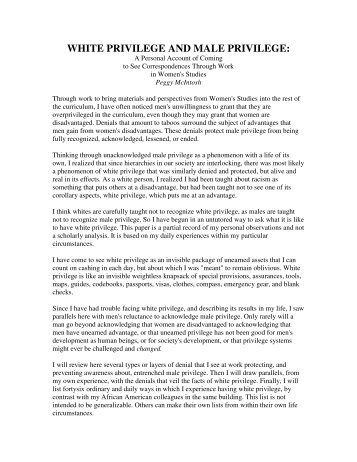

- UNPACKING THE INVISIBLE KNAPSACK CITATION FOR FREE
- UNPACKING THE INVISIBLE KNAPSACK CITATION HOW TO
- UNPACKING THE INVISIBLE KNAPSACK CITATION PROFESSIONAL
One of the primary strategies for retaining these individuals, and ensuring their success, is quality mentorship. Neuropsychology has struggled to recruit and retain trainees and early career professionals from historically marginalized communities (HMC). These results also highlight the need for a greater emphasis on mentorship training within neuropsychology, including training in culturally responsive mentorship practices.
UNPACKING THE INVISIBLE KNAPSACK CITATION PROFESSIONAL
These results highlight a variety of perspectives and approaches to mentorship, which may be beneficial for mentors to consider as they reflect on their mentorship practices and/or for trainees as part of their professional development toward becoming future mentors themselves. Two barriers to providing effective mentorship identified most by mentors were time constraints and a lack of training.
UNPACKING THE INVISIBLE KNAPSACK CITATION HOW TO
They reported an interest in more training on how to engage in culturally competent mentorship. Mentors described practices related to discussing diversity-related differences with their trainees including self-disclosure, creating a safe space for conversations, and tailoring discussions to the individual trainee. A majority reported that their training program is not diverse and they themselves do not mentor trainees from diverse backgrounds which provides a clear area for targeted efforts to recruit and retain diversity in the discipline. Reported best practices included being self-aware and engaging in a personalized approach to mentorship relationships that varies depending upon the needs of the mentee. Mentors identified assessment, professionalism, and ethics as top priorities in mentorship, which may reflect the overlap within neuropsychology of assessment supervision and mentoring.
UNPACKING THE INVISIBLE KNAPSACK CITATION FOR FREE
Themes were derived using qualitative analyses for free response questions, and descriptive statistics were calculated for quantitative variables. Self-identified mentors in clinical neuropsychology completed a survey about their mentorship practices, including culturally responsive mentorship, as well as perceived barriers and challenges to providing effective mentorship. Limited past work has been conducted on mentorship within neuropsychology, and there is a need to better understand the experiences and perspectives of neuropsychology mentors. Neuropsychology trainees have identified mentorship as an important factor in their training. To ensure future clinical utility and professional viability, it is imperative that neuropsychology as a field, and particularly the non-Hispanic White majority of its membership and organizational leaders, unpack its invisible knapsack of privilege and acknowledge the ways in which such privilege can insidiously compromise individual and systemic responses to the ongoing crisis of insufficient workforce characteristics, psychometric tools, and empirical research basis to address increasing patient diversity and neuropsychological health care disparities. The present examination suggests that white privilege within the field of neuropsychology may perpetuate health care disparities relevant to practice and research and the field’s insufficient systemic response to its longstanding challenges related to workforce demographics and psychometric instrumentation. Utilizing McIntosh’s paradigm of “unpacking the invisible knapsack of white privilege,” this author (a non-Hispanic White, Spanish-English bilingual man) conducted an idiographic, qualitative examination of ways in which non-Hispanic White neuropsychologists may experience unearned and largely invisible (unexamined) privilege. This commentary describes a qualitative examination of white privilege in neuropsychology, its implications for the field, and recommendations to move forward. This disconnect threatens the future clinical utility and professional viability of the field, and may at least in part be related to white privilege. A persistent and growing challenge to the field of neuropsychology is the disconnect between: (a) the increasingly culturally/linguistically diverse populations in need of clinical and research evaluations and (b) a neuropsychology workforce and ‘toolkit’ of validated instruments and norms that remain generally ill-prepared to address these needs.


 0 kommentar(er)
0 kommentar(er)
